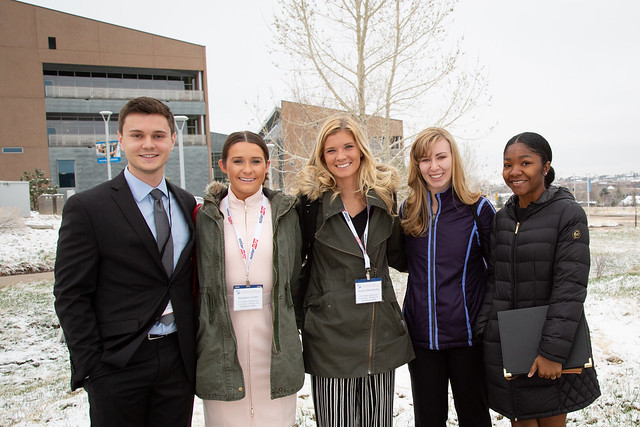June 04, 2019

NetZero Engineering Consultants teamed up with students in Architectural Studies to create single family, multifamily and apartment building models for completely off-the-grid housing. They entered in the Solar Decathlon competition through the U.S. Department of Energy, and their project won Outstanding Undergraduate Achievement for the Mixed-Use Multifamily Housing Division.
Advanced coursework and difficult problems challenge MU Engineering students throughout their undergraduate studies, but in senior capstone courses, they have the opportunity to apply all they’ve learned to real-world problems.
The College’s capstone program is unique because it allows students to act as consultants and project engineers developing solutions for actual clients. Whether it be designing a new method of waste management for the MU Dairy Farm or optimizing the pharmacies at the University Hospital, students must work in teams to produce results in just one semester.
Though by their senior year many students have already done internships, the capstone program lets them look at problems from a bird’s eye view coming up with solutions for complex projects. Making creative and cost effective plans to present to clients like 3M and the City of Columbia pushes the graduating seniors to act as if they’re already in the workforce.
John Bowders has been teaching the Civil and Environmental Engineering capstone course for three years, and since he started, he’s changed the program so students could work with more clients in an industry-type setting.
“I wanted to have the students have more of a personal interaction and the kind of interaction that they might expect in their first years of their job,” he said. “I also wanted them to have an experience that they’re actually contributing to whatever their project is.”
The capstone projects are often large with no single definitive solution. For instance, take the team NetZero Engineering Consultants. They were tasked by the Columbia Office of Sustainability with designing a mixed-use multifamily housing structure that produces as much energy as it uses. NetZero Engineering Consultants teamed up with students in Architectural Studies to create single family, multifamily and apartment building models for completely off-the-grid housing. They entered in the Solar Decathlon competition through the U.S. Department of Energy, and their project won Outstanding Undergraduate Achievement for the Mixed-Use Multifamily Housing Division.
Bowders wants the course to drive students to think beyond their traditional mindset of solving homework problems and doing schoolwork.
“It’s important because students tend to get into the idea that ‘I open my book, and there’s a bunch of problems in the back. I work it out, and I get the answer,’” he said. “In our life, in the consulting engineering business, it’s nothing like that. There’s never one answer.”
Jim Noble, who has taught the Industrial and Manufacturing Systems Engineering capstone for the last 27 years, agreed, saying that the course helps students look through a bigger lens.
“This is the one chance they have to do this because they’re not doing it for pay — it’s not their boss,” he said. “They’re doing an actual deliverable, but they can also step back and think broader. They can take everything they’ve learned over the course of our curriculum and try to bring some synthesis to that, so they see how it fits together.”
Working with local companies, students in the capstone for Industrial and Manufacturing Systems Engineering work with healthcare providers, logistics providers or manufacturing companies. In the past, the capstone has worked with Cerner, Socket, Scholastic Books and 3M.
This year, the capstone had the rare opportunity to do three projects with the same client, the pharmacies at the University Hospital. Working with the pharmacy at the Women’s and Children’s Hospital, Ellis Fischel Cancer Center and University Hospital, the teams had to find ways to improve the facilities in the short term as well as what they’d change if they were starting from scratch.
Zachary Klein was on the team assigned to the Ellis Fischel pharmacy, and he said that the project was challenging but well worth the valuable experience.
“It allows you to work with an actual company, real data and try to get them results. In homework, you can go find it online or in some cases, not really care whether the answer is correct or not,” he said. “In this, you’ve got to get something that’s doable for the company and reflects well on yourself, your team and, ultimately, the professor who’s teaching you.”
For Information Technology senior Eric Rachell, his team took a different route from the typical networking or cyber security projects. Their research focused on developing an algorithm to map the human perceptions of dominant colors in cinematography in a time efficient manner. Rachell said the course granted them the opportunity to do something different.
“Overall, we learned a lot, and it’s something unique for IT,” he said. “A lot of IT is web or mobile development, so we kind of deviated from that. The capstone class gave us space to do that.”
The Mechanical and Aerospace Engineering capstone also had a number of extraordinary projects, with teams developing straws that cool your drink by more than 30 degrees or automatic egg scramblers. Ultimately, the capstone program is meant to encourage creativity, but also expose students to critical skills not taught in other engineering courses.
Noble said he wants students to learn how to market their ideas to clients and effectively show why their ideas are the best.
“It’s a writing intensive class, but really it’s communication intensive,” he said. “The technical side, that’s what the rest of their curriculum is on. So now is the time to bring it all together and show that you can make an impact that people care about.”